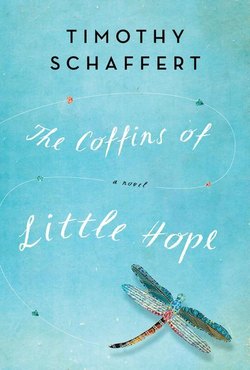Читать книгу The Coffins of Little Hope - Timothy Schaffert - Страница 12
На сайте Литреса книга снята с продажи.
· 6 ·
ОглавлениеBut if we were to begin at the beginning, we would need to begin, strangely enough, with a book, the eleventh book in an eleven-book series. Many of you have read it at least once by now, whether aloud to a child at bedtime or simply to yourself. The eleven-book saga took years to unfold, invoking nightmares among generations of children. Many otherwise stable men and women well into their forties still feel struck with the heebie-jeebies when they recall the gothic predicaments of the two sisters, Miranda and Desiree, the innocent wards of Rothgutt’s Asylum for Misguided Girls.
The eleventh book was long anticipated. We were finally to learn the fate of Miranda and Desiree, who’d spent the first ten books longing for their mother to come and collect them from the dank, infested halls of Rothgutt’s. Even if you had never read a word of the Miranda-and-Desirees, it was impossible not to be versed in the language of the books, and their characters and places, and to be curious about how it all might end.
The first Miranda-and-Desiree books were morbid curiosities with small print runs, but eventually mad housewives in Middle America challenged the books at their local libraries. The books worked their way up the national banned books lists; they went up in smoke in bonfires fueled by zealots. When one First Lady took as her cause a campaign against violence in children’s entertainment and censured the Miranda-and-Desirees for their inappropriate carnival of calamities, it was as if the publisher had rigged the lottery.
And that was how my family’s newspaper, the County Paragraph, came to use its press to print a portion of the Miranda-and-Desiree novels. The series’ publisher was a company in New York called Henceforth Books, and it was seeking presses in obscure parts of the country where it could covertly print the novels, avoiding the security breaches that had led to thieved copies, details leaked, plots spoiled. Executives of Henceforth consulted a Washington Post article called “The Last Gasps of the Small-Town Chronicle,” in which the Paragraph was profiled among several little-town Tribunes, Republics, Heralds, Independents, Sentinels, and Optimists.
Doc, my grandson, was unhappy with the article—he’d been painted with a broad brush as a tad hapless, having built, in the country, a massive new state-of-the-art press, anticipating contracts with other area publications—a miscalculation, as newspapers decades old, some of them more than a century old, toppled all around us with minimal fanfare.
Though Doc foolishly underbid in his determination to become one of the several small-town publishers printing the books, and foolishly expanded the press’s equipment to allow for the particulars of book publishing—the binding and the sewing and the finishing of the spine—the deal did manage to keep the press from getting mauled by its own gears. And had not the books become central to our conversations about Lenore, we would likely still be keeping mum about our involvement, just as we had since we’d first contracted with Henceforth Books, our confidentiality clauses quite rigid. When the books were being printed, the factory lights were dimmed to prevent workers from seeing so much as a single word; employees were subjected to pat-downs and searches of their lunch boxes by private security firms sent in by Henceforth. Midnight trains chugged up along rarely used tracks at the back of the factory, our forklifts cradling the boxes of books into the cars, to be delivered to the world. All that activity, and all that employment, and none of us breathed a word of it to anyone.
